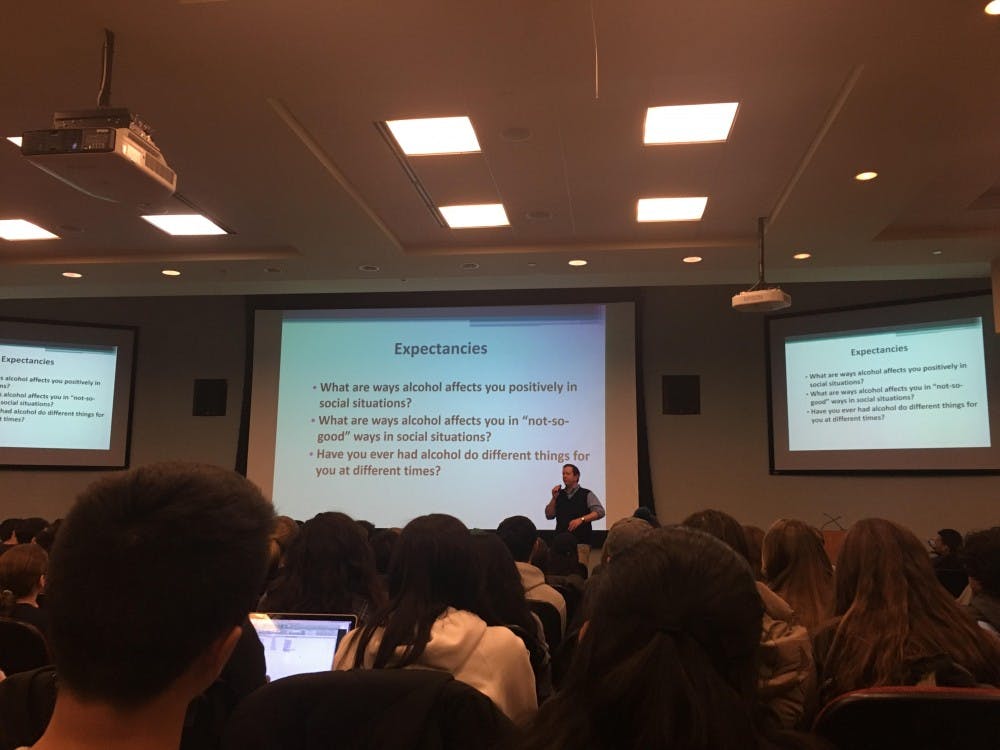Substance abuse researcher Jason Kilmer of the University of Washington presented a talk on Monday explaining the social, physical and psychological effects of substance abuse. The talk was titled “Beer Goggles to Blackouts: The Science of Substance Use.”
Kilmer began his presentation on the covert effects of people’s expectations regarding alcohol, describing an experiment done at the Addictive Behaviors Research Center at the University of Washington.In the experiment, participants were separated into an alcohol-receiving group and a placebo-receiving group. Within each group, participants either had the expectation of receiving alcohol or a non-alcoholic tonic water.
Through this experiment, Kilmer showed that the behaviors of each group could be influenced by subconscious cognitive beliefs.
In groups where participants expected to receive alcohol, observers could not tell the difference between the actions of the placebo group and those of the group who received alcohol.
In the group who received alcohol but did not expect to receive it, participants experienced the physical effects of alcohol but did not attribute those effects to being drunk.
“They got tired, because alcohol is a depressant, but they blamed it on having a long day of school,” Kilmer said. “They got flushed or hot, they blamed it on the temperature of the room.”
Kilmer further explained that one of the biggest predictors of drinking heavily in college and an obstacle to reducing underage drinking is the positive associations students make with alcohol consumption.
“A barrier to considering cutting down is missing out on all the good social stuff from alcohol, [but] we have no evidence it’s coming from alcohol,” Kilmer said. “Your comfort may have as much to do with having a cup in your hand as the contents of that cup.”
Kilmer also highlighted the impact of substance abuse in information processing, explaining that people’s attention becomes more limited when consuming alcohol, a condition he called alcohol myopia.
“The more we drink, the more alcohol impairs how we process information,” Kilmer said. “It narrows our attention down to the most salient internal feeling. That’s what it means for inhibitions to go down. It’s that those inhibitory cues are there, but we attend less and less to them.”
Kilmer also demonstrated the negative effects of substance abuse on physical performance, drawing from a study on how substance abuse impacts athletes.
“[Alcohol leads to] slower recovery in muscle movements, reduced decision making speed and reduced quality of responses to visual stimuli,” Kilmer said.
In addition, Kilmer said that substance abuse at night prevents users from getting a good night’s sleep.
He also noted that marijuana impairs performance by increasing heart rate, which decreases the maximum duration for which someone can exercise.
Kilmer further explained the idea of developing a tolerance to alcohol, saying that tolerance has more environmental factors than physical influences. He depicted tolerance as a result of conditioning, so that when certain environments are paired with drinking, aspects of the environment — such as time, companionship and taste — become cues associated with drinking.
“If you have a drug like alcohol as a central nervous system depressant, [when the body] knows the alcohol is coming, it starts speeding up,” Kilmer said.
Kilmer concluded that it takes higher amounts of alcohol to reach the same subjective level of intoxication because of the body’s conditioned response, resulting in a tolerance.
He emphasized that overdose might not be the result of excessive consumption but rather a new environment that affects the conditioned response.
“In a new environment, [the body’s response] won’t happen because the cues are not there to make it happen, which can result in an overdose,” Kilmer said.
Sophomore Francesca Kroll stated that she found the lecture interesting and informative.
“I really liked the experiment on the effects of expected alcohol and actual alcohol, and how [these effects] were really similar,” Kroll said. “It showed a lot about how your expectations can influence your response to alcohol [and] how you don’t necessarily need alcohol to have fun.”
Sophomore Jenna Movsowitz said that psychological effects are important to consider.
“People don’t really think about the psychological effects of drinking. They just do it to have fun and be social,” Movsowitz said.
Sophomore Nancy Zhang added that it was interesting how people do not typically think about how social context impacts alcohol consumption.
“It makes me more aware of how much I should be drinking when I am in unfamiliar situations and [have] to be more careful,” she said.





